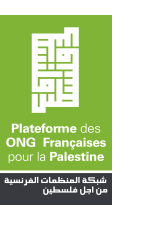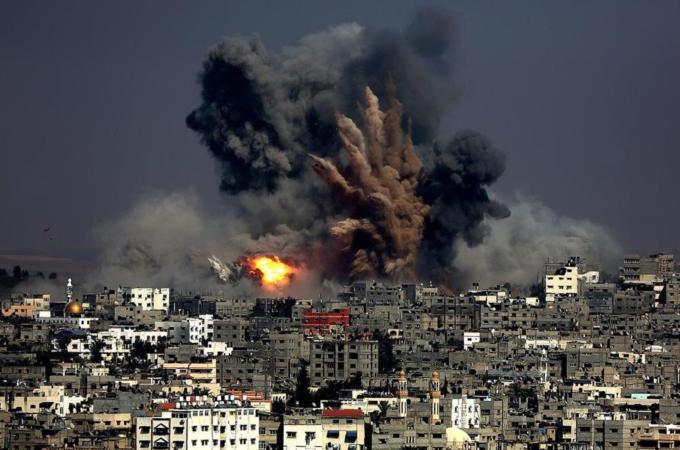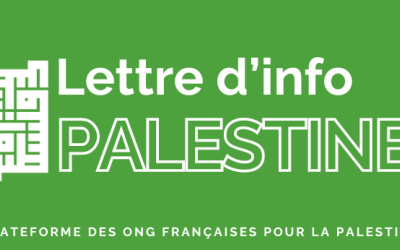


Gaza through the distorted lens of French media
La couverture médiatique de l’offensive militaire israélienne sur la bande de Gaza par les journalistes français est biaisée. Elle créée l’impression d’un équilibre dans le rapport de force. Or Israël a l’une des armées les plus puissantes et l’une des économies les plus dynamiques du monde alors que Gaza n’a ni armée ni économie viable et que sa population vit sous blocus depuis 7 ans.
L’offensive militaire israélienne est présentée comme une guerre ou un conflit entre Israël et Gaza, voir entre Israël et le Hamas. La responsabilité de l’escalade de violence est souvent rejetée sur les Palestiniens, reprenant les tentatives de justification de l’armée israélienne. On rappelle constamment aux lecteurs le droit d’Israël à la légitime défense sans jamais mentionner celui des Palestiniens.
Bref, sous couvert de neutralité, les médias français ne montrent pas la réalité du terrain : celle causée par les bombardements israéliens, le blocus, l’occupation et l’apartheid.

« The public’s right to access comprehensive, free, independent and pluralistic information must guide the journalist while performing his/her mission. This responsibility vis-a-vis the citizen takes precedence over any other ». This ethos, according to the French Journalists Syndicate’s Code of Ethics, should act as the guiding principles for French journalists in their endeavour to research, write and comment on current affairs.
Recently, however, French journalists’ commitment to this code of ethics has been questioned in light of their coverage of the ongoing Israeli onslaught on the Palestinians in Gaza.
An emphatic characteristic of French mainstream coverage of this episode of the Israeli-Palestinian conflict is its persistent attempt to constantly reframe or redefine the very nature of the conflict by creating the perception of balance of power between the Israeli and Palestinian forces, when such does not exist in reality. This persistence results in the production of biased information and reporting which misrepresents the situation.
Since the beginning of the Israeli onslaught, more than 1,400 Palestinian civilians (including over 200 children) have been killed, thousands more wounded and thousands of civilian buildings destroyed by Israeli bombardment. On the Israeli side there have been three civilian deaths and 64 soldiers killed.
Nonetheless, the discourse permeating French media tends to treat both sides of the conflict equally : Israel, which has one of the most powerful armies and one of the strongest economies in the world and which enjoys western backing ; and Gaza, which obviously has no army or sustainable economy and has been enduring a severe blockade for over seven years.
Accordingly, the Israeli military onslaught on Palestinians in Gaza is mostly framed as a war or conflict between Israel and Gaza, or between Israel and Hamas, as reflected in several newspapers’ headlines such as Le Monde, Liberation, Le Figaro and Le Point. And at times, this offensive is reduced to a duality between Hamas and the Israeli prime minister, as it was summerised by the Nouvel Observateur magazine, when it posed the question : « How could Hamas get out of this conflict while they are trapped by their obsession to finish off the Israeli prime minister ».
There are also constant attempts to sway public opinion in order to place emphasis on the Palestinians’ « responsibility » for triggering the Israeli onslaught in the first place, and for causing the Palestinian people’s suffering. For example, on the third day of the Israeli offensive, in an interview on France3 channel, Leila Shahid, Ambassador of Palestine to the European Union, was talking about the killing of 80 Palestinian civilians by Israeli bombing, when the host interrupted to say : « Why don’t you ask Hamas to stop firing rockets on Israel ? » Similarly, the magazine Marianne ran a story with the title : « Where is Hamas taking the Palestinians ? »
This superficial assumption resurfaced again when Palestinian resistance factions rejected the inadequate ceasefire proposed by Egypt. French media emphasised the « rejection » and again accused the Palestinian resistance of prolonging the conflict ; Israel was framed as an icon of pacifism for accepting and no questions were asked about the nature of the ceasefire, the reason behind Israel’s quick acceptance while none of its military objectives had been achieved, and its relationship with the Egyptian regime. Such a superficial approach belies a profound lack of analytical insight and belittles people’s intelligence.
Mainstream media has also systematically described Israeli bombing, destructive and deadly as it is, as a « response » to the Palestinian resistance’s rockets, thus propelling Israel’s self-defence narrative. While Palestinian rockets are counted daily, the number of raids and missiles fired from Israeli planes on the Palestinian population is rarely mentioned.
Most French mainstream media have also used ambiguous language to create a false parity between the devastation and deaths suffered on the Palestinian side and the limited damage inflicted on the Israeli side. Le Journal Du Dimanche, for example, ran a story on the fourth day of the Israeli assault, with a title "Israel-Hamas more than 100 deaths in 4 days”, thus conveniently masking the Palestinian death toll.
France2 TV channel dedicated plenty of airtime to explain in detail the daily life of an Israeli family, showing a father carrying his little girl who was frightened by the noise of a rocket as well as scenes of the damage caused by the rocket. There was no report on what life is like for Palestinians under Israeli bombing.
The following day, that same channel aired similar images of an Israeli woman carrying a baby and describing her fear and anxiety under the daily rocket fire. The same report purported to show the Palestinian side, where instead of documenting the extent of destruction and death, the camera went around a Palestinian house which was still intact, as a Palestinian father described how his family took cover from Israeli bombing !
And when some TV channels happen to show the losses on the Palestinian side, it is always followed by a detailed explanation parroting the Israeli army’s justifications that the onslaught only aims to target Hamas’ fighters and the tunnels threatening Israel’s security. Rarely, however, are there images reflecting the enormity of the Palestinian catastrophe. Thus, when on July 19, a French TV report showed footage from a Gaza hospital where many injured and dead were brought in, it was followed by another one which detailed Israeli army operations, focusing on Palestinian fighters using tunnels to get into Israeli-controlled territory.
Thus while viewers are reminded that Israel has the right to defend itself, there is no mention of Palestinians having that same right, for their fighters are presented as terrorists. The Israeli army’s targeting of Palestinian civilians is not questioned and there is no discussion of the motives of the Palestinian Resistance.
This apparent willingness of French mainstream media to omit the real causes of the conflict and to mislead the public about the obvious imbalance of power on the ground amounts to flagrant misinformation, and at times even to fragrant lies. Therefore, the media’s purported neutrality in covering the Israeli-Palestinian conflict fails to show the reality on the ground : Palestinian suffering caused by Israeli bombardment, blockade, occupation, and apartheid.
Few French journalists are ready to challenge this dominant pro-Israeli (to say the least) narrative and abide by the spirit of the journalistic code of ethics by working to provide objective information and analysis of the situation in Gaza and Palestine as a whole.
Ali Saad is a French sociologist and media critic, focusing on the influence of mass media on society.
Articles associés
 30 mai 2024
30 mai 2024Rafah, blocus étudiants et écocide Analyses politiques et géopolitiques Colonisation Eau Bande de Gaza Politique française Jérusalem Autorité palestinienne Positions officielles de la France Nations unies Torture et mauvais traitements Universités Agriculture Etat de Palestine Droit international Solidarité internationale Enfance/jeunesse Histoire/analyse politique Culture / art Réfugiés palestiniens Destructions Aide internationale La question palestinienne en France Occupation/annexion Diplomatie Hamas Société civile Transferts forcés Crime de guerre UE/Palestine Société française Liberté d’expression Armement Violence des colons Cour Pénale Internationale Criminalisation Impunité Climat/environnement Apartheid
 18 avril 2024
18 avril 2024Hôpital Al-Shifa, ventes militaires françaises et demande de cessez-le-feu Analyses politiques et géopolitiques Colonisation Eau Bande de Gaza Développement UE/Israël Politique française Jérusalem Autorité palestinienne Nations unies Torture et mauvais traitements Agriculture Etat de Palestine Droit international Solidarité internationale Enfance/jeunesse Histoire/analyse politique Santé Prisonniers palestiniens Vallée du Jourdain Destructions Aide internationale La question palestinienne en France Société (Palestine/Israël) Occupation/annexion Hamas Société civile Crime de guerre UE/Palestine Liberté d’expression Armement Violence des colons Climat/environnement Apartheid Guerre
 11 mars 2024
11 mars 2024Gaza : famine, trêve, médias français La question palestinienne en France Torture et mauvais traitements Cour Pénale Internationale Histoire/analyse politique Société (Palestine/Israël) Solidarité internationale Analyses politiques et géopolitiques Défenseur.e des droits de l’Homme Réfugiés palestiniens Liberté d’expression Autorité palestinienne Produits des colonies Droit international Aide internationale Occupation/annexion Violence des colons Politique française Hamas Jérusalem UE/Israël Colonisation Destructions Apartheid Bande de Gaza
Campagne en cours
Dernières publications
 31 mai 2024
Européennes : quels engagements des candidats pour la Palestine ?
La question palestinienne en France
UE/Palestine
31 mai 2024
Européennes : quels engagements des candidats pour la Palestine ?
La question palestinienne en France
UE/Palestine
 30 mai 2024
Rafah, blocus étudiants et écocide
Analyses politiques et géopolitiques
Colonisation
Eau
Bande de Gaza
Politique française
Jérusalem
Autorité palestinienne
Positions officielles de la France
Nations unies
Torture et mauvais traitements
Universités
Agriculture
Etat de Palestine
Droit international
Solidarité internationale
Enfance/jeunesse
Histoire/analyse politique
Culture / art
Réfugiés palestiniens
Destructions
Aide internationale
La question palestinienne en France
Occupation/annexion
Diplomatie
Hamas
Société civile
Transferts forcés
Crime de guerre
UE/Palestine
Société française
Liberté d’expression
Armement
Violence des colons
Cour Pénale Internationale
Criminalisation
Impunité
Climat/environnement
Apartheid
30 mai 2024
Rafah, blocus étudiants et écocide
Analyses politiques et géopolitiques
Colonisation
Eau
Bande de Gaza
Politique française
Jérusalem
Autorité palestinienne
Positions officielles de la France
Nations unies
Torture et mauvais traitements
Universités
Agriculture
Etat de Palestine
Droit international
Solidarité internationale
Enfance/jeunesse
Histoire/analyse politique
Culture / art
Réfugiés palestiniens
Destructions
Aide internationale
La question palestinienne en France
Occupation/annexion
Diplomatie
Hamas
Société civile
Transferts forcés
Crime de guerre
UE/Palestine
Société française
Liberté d’expression
Armement
Violence des colons
Cour Pénale Internationale
Criminalisation
Impunité
Climat/environnement
Apartheid
> Toutes les publications










